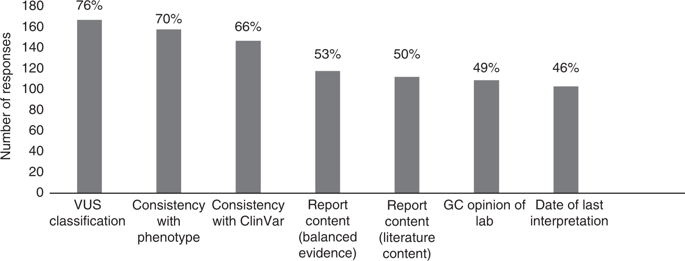当前位置:
X-MOL 学术
›
Genet. Med.
›
论文详情
Our official English website, www.x-mol.net, welcomes your
feedback! (Note: you will need to create a separate account there.)
Variant interpretation is a component of clinical practice among genetic counselors in multiple specialties.
Genetics in Medicine ( IF 6.6 ) Pub Date : 2019-11-22 , DOI: 10.1038/s41436-019-0705-9 Karen E Wain 1 , Danielle R Azzariti 2 , Jennifer L Goldstein 3 , Amy Knight Johnson 4, 5 , Patti Krautscheid 6 , Brianna Lepore 1 , Julianne M O'Daniel 3 , Deborah Ritter 7 , Juliann M Savatt 1 , Erin Rooney Riggs 1 , Christa Lese Martin 1
Genetics in Medicine ( IF 6.6 ) Pub Date : 2019-11-22 , DOI: 10.1038/s41436-019-0705-9 Karen E Wain 1 , Danielle R Azzariti 2 , Jennifer L Goldstein 3 , Amy Knight Johnson 4, 5 , Patti Krautscheid 6 , Brianna Lepore 1 , Julianne M O'Daniel 3 , Deborah Ritter 7 , Juliann M Savatt 1 , Erin Rooney Riggs 1 , Christa Lese Martin 1
Affiliation

|
PURPOSE
Genomic testing is routinely utilized across clinical settings and can have significant variant interpretation challenges. The extent of genetic counselor (GC) engagement in variant interpretation in clinical practice is unknown. This study aimed to explore clinical GCs' variant interpretation practice across specialties, understand outcomes of this practice, and identify resource and educational needs.
METHODS
An online survey was administered to National Society of Genetic Counselors members providing clinical counseling.
RESULTS
Respondents (n = 239) represented all major clinical specialties. The majority (68%) reported reviewing evidence documented by the laboratory for most (>60%) variants reported; 45.5% report seeking additional evidence. Prenatal GCs were less likely to independently assess reported evidence. Most respondents (67%) report having reached a different conclusion about a variant's classification than the testing laboratory, though infrequently. Time was the most commonly reported barrier (72%) to performing variant interpretation, though the majority (97%) indicated that this practice had an important impact on patient care. When presented with three hypothetical scenarios, evidence typically used for variant interpretation was generally applied correctly.
CONCLUSION
This study is the first to document variant interpretation practice broadly across clinical GC specialties. Our results suggest that variant interpretation should be considered a practice-based competency for GCs.
中文翻译:

变异解释是多个专业遗传咨询师临床实践的一个组成部分。
目的基因组测试通常在临床环境中使用,并且可能面临重大的变异解释挑战。遗传咨询师 (GC) 在临床实践中参与变异解释的程度尚不清楚。本研究旨在探索临床 GC 跨专业的变异解释实践,了解这种实践的结果,并确定资源和教育需求。方法 对提供临床咨询的国家遗传咨询师协会成员进行在线调查。结果 受访者 (n = 239) 代表了所有主要的临床专业。大多数(68%)报告审查了实验室记录的大多数(>60%)变异报告的证据;45.5% 报告寻求更多证据。产前 GC 不太可能独立评估报告的证据。大多数受访者 (67%) 报告说,他们对变体的分类得出了与测试实验室不同的结论,尽管这种情况并不常见。时间是执行变异解释最常见的障碍 (72%),尽管大多数 (97%) 表示这种做法对患者护理有重要影响。当呈现三种假设情景时,通常用于变体解释的证据通常被正确应用。结论 本研究首次广泛记录了跨临床 GC 专业的变异解释实践。我们的结果表明,变异解释应被视为 GC 的基于实践的能力。时间是执行变异解释最常见的障碍 (72%),尽管大多数 (97%) 表示这种做法对患者护理有重要影响。当呈现三种假设情景时,通常用于变体解释的证据通常被正确应用。结论 本研究首次广泛记录了跨临床 GC 专业的变异解释实践。我们的结果表明,变异解释应被视为 GC 的基于实践的能力。时间是执行变异解释最常见的障碍 (72%),尽管大多数 (97%) 表示这种做法对患者护理有重要影响。当呈现三种假设情景时,通常用于变体解释的证据通常被正确应用。结论 本研究首次广泛记录了跨临床 GC 专业的变异解释实践。我们的结果表明,变异解释应被视为 GC 的基于实践的能力。结论 本研究首次广泛记录了跨临床 GC 专业的变异解释实践。我们的结果表明,变异解释应被视为 GC 的基于实践的能力。结论 本研究首次广泛记录了跨临床 GC 专业的变异解释实践。我们的结果表明,变异解释应被视为 GC 的基于实践的能力。
更新日期:2019-11-22
中文翻译:

变异解释是多个专业遗传咨询师临床实践的一个组成部分。
目的基因组测试通常在临床环境中使用,并且可能面临重大的变异解释挑战。遗传咨询师 (GC) 在临床实践中参与变异解释的程度尚不清楚。本研究旨在探索临床 GC 跨专业的变异解释实践,了解这种实践的结果,并确定资源和教育需求。方法 对提供临床咨询的国家遗传咨询师协会成员进行在线调查。结果 受访者 (n = 239) 代表了所有主要的临床专业。大多数(68%)报告审查了实验室记录的大多数(>60%)变异报告的证据;45.5% 报告寻求更多证据。产前 GC 不太可能独立评估报告的证据。大多数受访者 (67%) 报告说,他们对变体的分类得出了与测试实验室不同的结论,尽管这种情况并不常见。时间是执行变异解释最常见的障碍 (72%),尽管大多数 (97%) 表示这种做法对患者护理有重要影响。当呈现三种假设情景时,通常用于变体解释的证据通常被正确应用。结论 本研究首次广泛记录了跨临床 GC 专业的变异解释实践。我们的结果表明,变异解释应被视为 GC 的基于实践的能力。时间是执行变异解释最常见的障碍 (72%),尽管大多数 (97%) 表示这种做法对患者护理有重要影响。当呈现三种假设情景时,通常用于变体解释的证据通常被正确应用。结论 本研究首次广泛记录了跨临床 GC 专业的变异解释实践。我们的结果表明,变异解释应被视为 GC 的基于实践的能力。时间是执行变异解释最常见的障碍 (72%),尽管大多数 (97%) 表示这种做法对患者护理有重要影响。当呈现三种假设情景时,通常用于变体解释的证据通常被正确应用。结论 本研究首次广泛记录了跨临床 GC 专业的变异解释实践。我们的结果表明,变异解释应被视为 GC 的基于实践的能力。结论 本研究首次广泛记录了跨临床 GC 专业的变异解释实践。我们的结果表明,变异解释应被视为 GC 的基于实践的能力。结论 本研究首次广泛记录了跨临床 GC 专业的变异解释实践。我们的结果表明,变异解释应被视为 GC 的基于实践的能力。











































 京公网安备 11010802027423号
京公网安备 11010802027423号